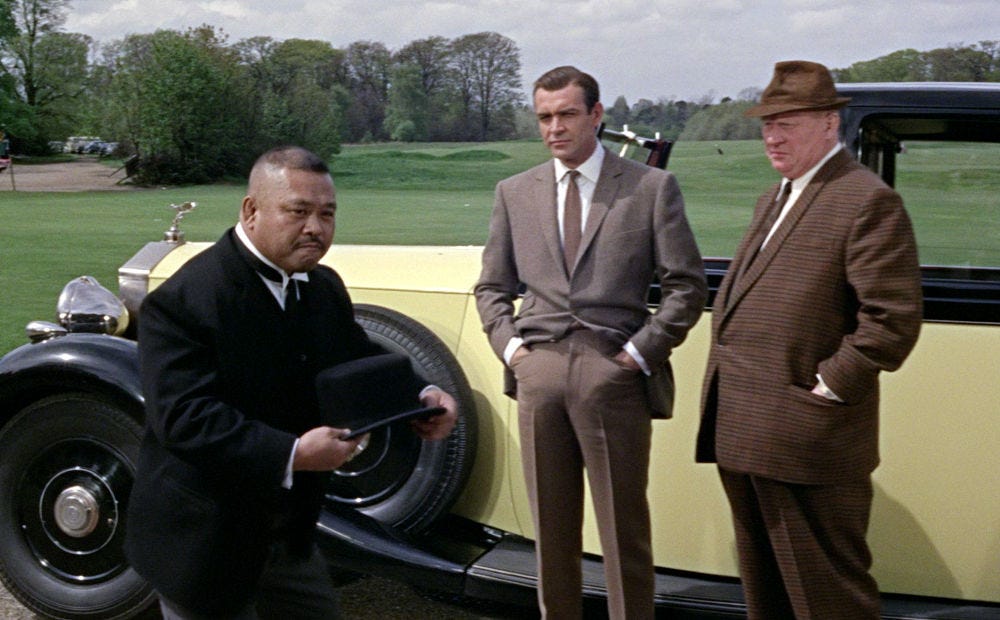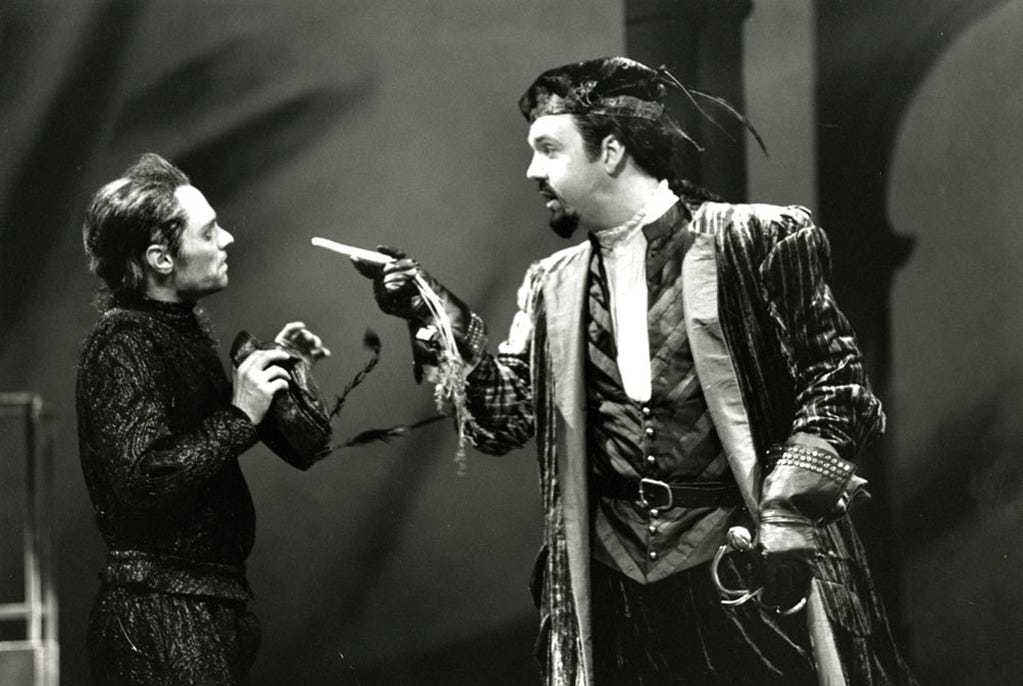History is littered with famous breakups - Samson and Delilah, Leon and Joe, Dean and Jerry, Paul and John, Steve and Woz, Shaq and Kobe. Of course none has had more (figurative) impact than the (biblical) falling out between Lucifer and God: once a high-ranking angel, Lucifer rebelled against God and was cast out of Heaven, becoming Satan - in sports parlance, a five tools Hitler with vastly more power and range.
The bitter breakup is described in Isaiah 14:12-15 and Revelation 12:7-9, but most vividly in Milton’s “Paradise Lost,” in which the poet gives the silver-tongued devil all the best lines:
Here, Satan reflects on his motives for rebelling and expresses the internal struggle that led him to forsake Heaven:
"Which way I fly is Hell; myself am Hell;
And in the lowest deep, a lower deep
Still threatening to devour me opens wide,
To which the Hell I suffer seems a Heaven."
And, most memorably, these, in which Satan reflects on the unsatisfying creature comforts of Heaven and his justifications for relocating down south:
"Here we may reign secure; and in my choice
To reign is worth ambition, though in Hell:
Better to reign in Hell, than serve in Heaven."
Milton gives voice to the angels who come under Satan’s influence and become, essentially, his muscle, beginning with Beelzebub, his second-in-command and a sinister combo of confidant, hype-man and enforcer:
"O Prince, O Chief of many throned Powers,
That led the embattled Seraphim to war
Under thy conduct, and in dreadful deeds
Fearless, endangered Heaven’s perpetual King;
And put to proof his high Supremacy." (Book I, Lines 128–132)
In Book II, the other mugs weigh in: Moloch, Belial and Mammon like what they hear - if anyone can sell ice to Eskimos, it’s Satan. They decide to join him and make their move.
This piece focuses on the sinister figure of the henchman, the indispensable right-hand man who will stop at nothing to protect his boss and benefactor (himself, too). So long as it’s not you who’s being threatened with bodily harm - or worse - the henchman is usually an entertaining mix of menace and comic relief, who, more often than not, receives summary justice in the form of a fittingly - and deeply satisfying - grisly end (I’m here for it if you are).
Muscle, Goon, Bruiser, Fixer, Lackey, Underling, Enforcer, Mook
Henchmen go by many monikers, but the word itself derives from the Old English “hengest” (horse) and “mann” (man), originally referring to a "groom" or "attendant to a knight." The term evolved to signify an obedient follower or subordinate who carries out orders, especially in criminal enterprises or villainous schemes. The defining characteristics include:
Servile, unquestioning loyalty to the leader/boss
Often more physically imposing than the leader/boss
Willing and eager to use violence or intimidation
Trusted to do whatever it takes to execute his orders with ruthless precision and efficiency.
Dimwitted (but not always).
Sometimes turns on the leader/boss, often unsuccessfully because, well, he’s a dimwit.
Typically a figure of comic relief (he is, after all, dim).
In fiction and film, expendable and usually gets his comeuppance (sometimes in spectacular fashion) before the main villain gets his (who, in a perverse twist, audiences tend to identify with and take a rooting interest in).
Notable henchmen include, but are certainly not limited to: Al Capone's enforcers like Frank Rio, Hitler's inner circle (Himmler, Göring, etc.), Stalin's chief enforcer Lavrentiy Beria, Chuck Colson (famously quoted as saying he would "walk over his own grandmother" to get Nixon re-elected), Pablo Escobar's sicarios, Renfield (Dracula's servant), Oddjob (Goldfinger's silent but deadly servant in James Bond), Luca Brasi (The Godfather), Dave Schultz (hockey’s iconic goon), Charles Oakley (MJ’s best friend and enforcer, referred to by Bill Simmons as the “real-life Shaft”), Elon and Vivek (kidding, I kid).
A Word on Sidekicks, Confidants, Henchwoman
Henchmen vs. Sidekicks. Sidekicks are usually genial sorts who provide companionship and humor in support of the main character or hero, whereas henchmen are enablers of the villain's ambition. Think Sancho Panza and George Costanza.
Henchmen vs. Confidants: a confidant is a trusted advisor or friend who offers emotional support, advice, and counsel. They provide honest feedback rather than blindly following orders or using intimidation/violence to enforce the boss’s agenda. Think Luca Brasi, Corleone Family muscle vs. Tom Hagen, Corleone Family consigliere.
Notable “Henchwomen.” Regrettably, there are none, at least none that fit the classic definition or reflect the defining characteristics. The Uma Thurman character in Tarantino’s Kill Bill comes to mind, but women with bad intent and evil agendas, usually fall into two broad categories: “the power behind the throne” or the femme fatale. Traditional power structures were male-dominated and until very recently, women had less access to positions of authority. No matter how strong or motivated (I’ve known women I wouldn’t want to meet in a dark alley), their methods historically involved manipulation, deception, and occasionally, poison (I’ve had suspicious bouts of food poisoning, but nothing life-threatening).
Several Personal Faves
Mosca, the Fly: from Ben Johnson’s Elizabethan comedy, “Volpone” (or the Fox)
First staged in 1605, Volpone is a timeless masterpiece that speaks to us with a remarkably modern voice (by which I mean sensibility). Once you get into the swim of it, it’s as wickedly funny as anything from David Mamet or Neil LaBute (“In the Company of Men," "Your Friends & Neighbors”). Volpone is a satirical comedy that revolves around greed, deception, and the corrupting influence of wealth. Set in Venice, the play tells the story of Volpone, a wealthy, childless conman, and his servant Mosca, who scheme to exploit the greed of three money-lusting “legacy hunters” named after carrion birds.
Mosca is a quintessential henchman, a cringing, servile "parasite" who lives off Volpone, and does much of the dirty work to keep the schemes afloat. However, he’s more than a mere subordinate - he’s the real brains of the operation, helping his master manipulate the conniving vultures who flock to his door bearing gifts, hoping to be named Volpone’s heir. Mosca brilliantly plays them off one another, often with elaborate lies and flattery, which he delivers with quicksilver wit. He breaks off into private monologues, delighting in his insidious cleverness.
"I am so limber. O! your parasite
Is a most precious thing, dropped from above,
Not bred ’mongst clods and clodpoles here on earth."“I fear
I shall begin to grow in love with my
Dear self, and my most prosperous parts; they do
So spring and burgeon; I can feel a whimsy
In my blood. I know not how, success hath made me wanton.""Honour? There’s no such thing in nature: a mere term
Invented to awe fools. What is my gold
The worse for touching, clothes for being looked on?
Why, this is like the fellow that burnt his house
To warm his guests."
Mosca is a darkly comedic figure, an absurd concoction of ambition and treachery. As the play progresses, Volpone's enjoyment of the scam grows, and he disguises himself to watch the chaos he's caused. Eventually, Volpone’s and Mosca’s schemes are exposed. In the end, the Venetian authorities intervene, punishing the various characters for their greed and dishonesty. Volpone is sentenced to prison, Mosca is sent to the galleys, and the other characters face various humiliations and penalties.
Dim from A Clockwork Orange
A Clockwork Orange occupies two relatively rarefied categories: it’s one of the few movies that is superior to the excellent novel on which it’s based, and as a movie, it’s one of the few that shocks on first viewing, and is hilarious every time thereafter. (This is a generational thing - today’s unfiltered younger people experience it as dark comedy - they don’t register shock, they’ve seen it all.)
The Burgess novel (published in 1962) and the Kubrick film (released in 1971) follows Alex and his gang (“droogies”) as they fight and rape their way through a ruined futuristic urban hellscape, hopped up on "milk-plus"- milk laced with drugs - which fuels their endless orgies of “ultra-violence.”
Dim is the gang’s muscle, and embodies the classic henchman: as his name suggests, Dim is a blunt object - abjectly loyal, goonish and as dumb as a bag of wet cement. “What’s it going to be then, eh?” he asks, waiting for instructions from Alex, who delights in both the control he has over Dim and Dim’s cheerful thuggery: "I could viddy myself very clear, and when I looked at Dim I saw he was sniggering away as though it had been all a great bit of fun."
There are early hints of Dim’s straining at the leash, as when he mocks Alex's high-flown language and refined tastes: “Yarbles! Great bolshy yarblockos to you. I’ll meet you with chain or nozh or britva any time, not having you aiming tolchocks at me reasonless.”
Eventually, he and another gang member betray Alex to the police.
Thomas Cromwell: the Henchman’s Henchman
Cromwell is the favorite henchman of your favorite henchman (in a manner of speaking). A minister to King Henry VIII, Cromwell was known as Henry’s ruthless hatchet man and fixer, Machiavelli’s Machiavel…until he was brilliantly and vividly reimagined in Hilary Mantel’s Wolf Hall trilogy.
In her retelling, Cromwell is a man of many talents, with a powerful and supple intelligence, a principled servant to an impulsive king, who learned to skillfully navigate Henry’s deadly capriciousness and viperish court. Here’s how Mantel describes him early on:
Thomas Cromwell is now a little over forty years old. He is a man of strong build, not tall. Various expressions are available to his face, and one is readable: an expression of stifled amusement. His hair is dark, heavy and waving, and his small eyes, which are of very strong sight, light up in conversation: so the Spanish ambassador will tell us, quite soon. It is said he knows by heart the entire New Testament in Latin, and so as a servant of the cardinal is apt – ready with a text if abbots flounder. His speech is low and rapid, his manner assured; he is at home in courtroom or waterfront, bishop's palace or inn yard. He can draft a contract, train a falcon, draw a map, stop a street fight, furnish a house and fix a jury. He will quote you a nice point in the old authors, from Plato to Plautus and back again. He knows new poetry, and can say it in Italian. He works all hours, first up and last to bed. He makes money and he spends it. He will take a bet on anything.
“You are a snake, Cromwell,” Margaret declares, conceding to his instructions. “Oh no. A dog, madam,” he retorts. The distinction succinctly captures the difference between the Cromwell taught in history books and the one Mantel brilliantly recreates.
Despite his intelligence, gift for survival and many years of loyal service, Cromwell eventually suffers the fate of henchmen through history, becomes a victim of the volatile court politics of the day and is condemned to death. Here, Mantle imagines his thoughts as he awaits his execution while imprisoned in the Tower of London (the following are excerpts spanning several pages):
Within nine days of his arrest, they have put together enough matter against him to bring a bill of attainder into Parliament
The only thing uncertain is by what process they will make him a corpse. If the king prefers to punish him for heresy, he will die by fire, perhaps beside Robert Barnes and his friends; if for treason, then likely enough he will go to Tyburn, to be cut up alive.
The king’s decision has spared him much agony and shame. He will pray for a clean stroke.
On the scaffold he will praise the king: his mercy, his grace, his care for all his people. It is expected of him, and he has a duty to those left behind. His foot is now on the step of the scaffold. His mind is quiet but the body has its own business, and that business includes trembling.
The pain is acute, a raw stinging, a ripping, a throb. He can taste his death: slow, metallic, not come yet. In his terror he tries to obey his father, but his hands cannot get a purchase, nor can he crawl. He is an eel, he is a worm on a hook, his strength has ebbed and leaked away beneath him and it seems a long time ago now since he gave his permission to be dead; no one has told his heart, and he feels it writhe in his chest, trying to beat.
A Viennese Table of Just Deserts
Audiences savor the grisly and poetic ends that befall hated henchmen, as they face the brutal consequences of their dark deeds: their heads are severed, necks snapped, bodies crushed, convulsed, torn asunder, set aflame, dissolved in acid, boiled alive, buried alive, thrown from helicopters, cliffs and rooftops, detonated, garroted, stomped, flayed, disemboweled, smothered and drowned, run through with broadswords, diced with machetes and riddled with bullets, left out in the desert to wither and rot as vultures wheel overhead and hyenas wait their turn…stalked, hounded, humiliated and disgraced, inevitably sent packing back to Fox News.
I could go on, but you get the point.








